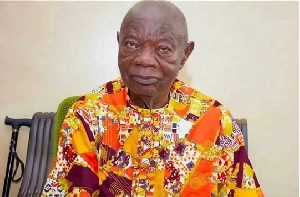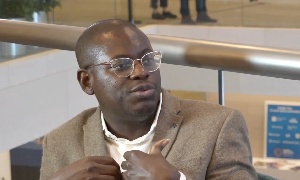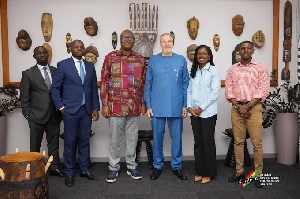- Home - News
- Elections 2024
- News Archive
- Crime & Punishment
- Politics
- Regional
- Editorial
- Health
- Ghanaians Abroad
- Tabloid
- Africa
- Religion
- Photo Archives
- Press Release
General News of Friday, 25 April 2025
Source: www.ghanawebbers.com
'The IMF can’t be our conscience' - Bright Simons warns of false security in Fund’s praise
Bright Simons, Vice President of IMANI Africa, warns against relying too much on the IMF. He calls it a “moral referee” for Ghana’s economic policy.
In an interview on Joy News’ PM Express Business Edition, he urged Ghanaians to be cautious. He described the IMF as unable to serve as a credible watchdog.
Simons pointed out a conflict of interest. The IMF is an intergovernmental organization created by governments to support themselves.
He believes it is unrealistic to expect the IMF to critique government performance honestly. Ghana is part of the decision-making process within the Fund.
“There’s a limit,” he said. Ghana's governor represents the country at the IMF board and advocates for its interests. An intergovernmental body cannot effectively check a sovereign government.
This conflict shifts scrutiny elsewhere, according to Simons. He argues that civil society should play a more central role in oversight. However, he feels the IMF does not want this involvement.
Simons explained that structural issues run deeper than just oversight. The IMF designs its programs and has incentives tied to their success.
“It’s unrealistic to expect them to be overly critical,” he stated.
He also discussed perception as another layer of complexity. The IMF aims to convince others that things are going well in Ghana.
“They signal positivity to investors and development banks,” he noted. If they do this, how can they afford to be negative?
This creates a façade that undermines local accountability, according to Simons. Relying solely on IMF policy surveillance is immature and hollow oversight.
He called for Ghanaians to rethink how they view IMF endorsements. “To what extent should we let the IMF define our performance?” he asked.
He highlighted how ministers often cite positive statements from the IMF as proof of success. Kristalina Georgieva praises leaders, creating an illusion of progress.
Simons urged citizens to approach these endorsements with skepticism. “We must ask: who else is saying something?”
However, he acknowledged a significant problem exists here: “That ‘who else’ is what we’re missing.”
The domestic surveillance mechanism limits civil society's influence over Ghana's elite and business leaders.
Entertainment










